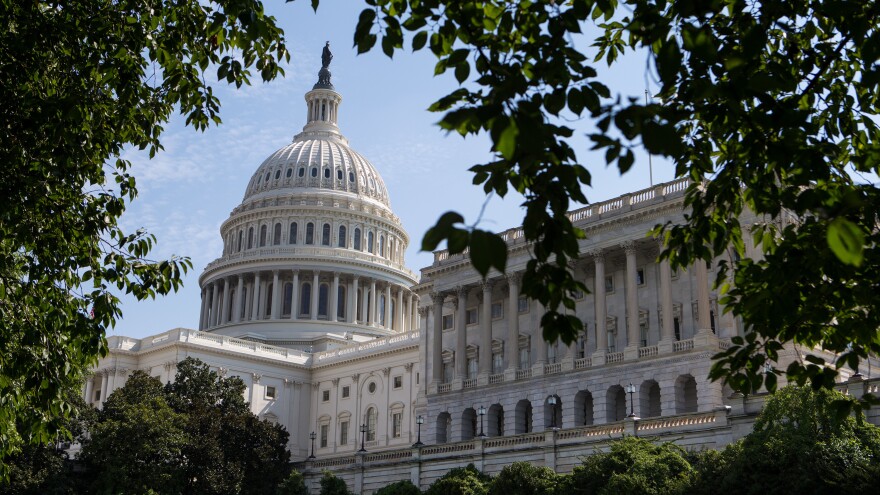BETHLEHEM, Pa. — Economists around the globe and in the Lehigh Valley are watching anxiously as the federal government creeps closer to its June 1 deadline to raise the debt ceiling.
If it doesn't, the results will be immediate and dire, said Ahmed Rahman, an associate professor of economics at Lehigh University.
"Economists don't agree on much, but here I think we're pretty much aligned," Rahman said. "The word is 'catastrophic.'"
- President Joe Biden and U.S. House Republicans remained engaged in protracted negotiations Monday evening over the debt ceiling
- The federal government expects to default unless the $31.4 trillion debt ceiling is raised by June 1
- A default could result in the loss of 7,600 jobs in Pennsylvania's 7th Congressional District alone, U.S. Rep. Susan Wild said
U.S. House Republicans and the Biden administration are in the midst of a protracted negotiation over the debt ceiling.
Since late 2021, the United States has limited its debt to $31.4 trillion. The federal government hit that total earlier this year, but has been shuffling money around to make sure its debts are paid.
In a letter to Congress last week, Treasury Secretary Janet Yellen said the country likely will default unless it can borrow more money before June 1.
Immediate recession
Despite repeated warnings, lawmakers and the White House didn't engage in serious negotiations for months.
House Republicans are demanding deep cuts on spending. Some, like former President Donald Trump, have encouraged the caucus to default if its demands aren't met.
Democrats have thus far balked. They passed several high-profile spending packages during Biden's term, and party officials are quick to point out Republican hardliners didn't threaten the global economy when Congress raised the debt ceiling three times during Trump's administration.
"The bottom line is that [with a] default, we will enter into a recession basically immediately."Ahmed Rahman, Lehigh University associate professor of economics
While the political nature of the debate and economics may be difficult for ordinary Americans to grasp, the fallout would prove all too real, Rahman said.
A default would throw lending markets into disarray, making it far costlier for families to secure mortgages, car loans and other lines of credit, he said.
"The bottom line is that [with a] default, we will enter into a recession basically immediately," Rahman said.
Businesses would face the same financial difficulties and could be forced to cut costs as a result.
'Neither a borrower nor lender be'
U.S. Rep. Susan Wild, D-Lehigh Valley, said Monday the House Budget Committee estimated a default would result in the loss of more than 7 million jobs nationwide.
The committee estimated the 7th Congressional District, which includes all of Carbon, Lehigh and Northampton counties plus a sliver of Monroe County, would lose 7,600 jobs, Wild said.
Even pushing the negotiations this close to the June 1 deadline could harm the U.S. economy, Rahman said.
"If you listen to Ben Franklin — 'neither a borrower nor lender be' — and you're out of the markets, it doesn't matter. If you have a job, the company is borrowing money on your behalf so it can pay you."Ahmed Rahman, Lehigh University associate professor of economics
House Republicans and President Barack Obama reached a similar impasse in 2011 before an 11th hour agreement. Still, Standard & Poor's reduced America's credit rating afterward — and the rating has yet to bounce back.
A similar credit rating downgrade isn't out of the question even if things are resolved soon.
Rahman compared a potential default to the 2008 financial crisis.
Many experts didn't expect that situation to get so quickly out of hand, figuring that at worst a few banks would collapse. However, those failures created a toxic business environment that dragged even healthy institutions.
"If you listen to Ben Franklin — 'neither a borrower nor lender be' — and you're out of the markets, it doesn't matter," Rahman said. "If you have a job, the company is borrowing money on your behalf so it can pay you."
Jobs not only fallout
Jobs aren't the only potential fallout. The House Budget Committee estimates showed 105,000 families in the district would see their Social Security payments stopped, Wild said.
Also, 282,000 residents in Wild's district would lose their Medicare, Medicaid or veteran affairs health benefits, she said.
"They can be as tough as nails during the negotiations, but don't tie up our debt ceiling with that."U.S. Rep. Susan Wild
She called on her Republican counterparts to agree to a clean debt-ceiling hike to avert the financial repercussions of default. Republicans have been demanding spending cuts, she said, but those talks are not directly tied to the debt ceiling.
Instead, those demands should be part of the annual budget process, where Congress decides how much it will spend and what programs will get funding, she said.
"They can be as tough as nails during the negotiations, but don't tie up our debt ceiling with that," Wild said.
It seems unlikely that will happen at this late stage of negotiations. Wild said Biden has proposed a spending freeze for 2024; Republicans have called for spending limits extending up to a decade.


